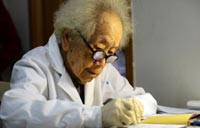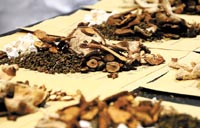Nanning medico finds his own worth in Africa
"The two trips will provide precious memories for the rest of my life. They've made my life more meaningful."
In Niger in 2005, he saw a child in a remote village die from appendicitis after enduring stomach pain for a long time. The most difficult thing for Chinese doctors working in Africa, he says, is not the harsh living conditions, water shortages, frequent power failures and hot weather, but the lack of equipment and medicines.
Zhong once put a thread of cotton under the nostril of a child in a coma to monitor the child's weak breathing.
Most operations are very cheap, but patients must pay for the narcotics, the infusion and injection of the medicines, the needles and tubes as well as the anti-inflammatory drugs, which cost about $8 at a Zinder street market, a big amount for most poor patients.
When he administered a general anesthetic, Zhong had to use one hand to press the breathing bag, while using the other hand to fasten the oxygen mask and lift the patient's jaw.
"I also had to lower my head and block the valve with my chin while supplying the oxygen and anesthetic gases in case of a leak," he says. Such moments made him feel that his expertise is more valuable in Africa than in Nanning.
On his way home after work, Zhong often met a Comoros mother carrying her baby of about 12 months. He always smiled to the shy mother and her child. To his surprise, one day the little boy burbled the Chinese greeting ni hao ("hello") to him.
"You can imagine my feelings at hearing such a little baby from such a different nation say ni hao to me even before he had learned his own language," Zhong says.
"Helping other people brings me true happiness that cannot be matched by the fleeting pleasures I get from material wealth and a comfortable life."
Zhong's role model is Norman Bethune, a volunteer Canadian doctor who sacrificed his life in China in 1939 during the War of Resistance against Japanese Aggression (1937-45).
"I didn't expect I'd have a similar chance to help people in poor, undeveloped countries."
In 2010, Zhong published a book documenting the work of Chinese doctors in African towns.
The simple language, firsthand stories and sincere emotions turned the book into an immediate success among Chinese doctors, especially those returning from Africa.
Other doctors take the book with them when they go back to Africa.
"My stay in Africa taught me more about the vulnerability of life and the value of the family. It was a life-changing experience for my patients and for me as well," Zhong writes in his book.
Su Qiulan contributed to the story.
























